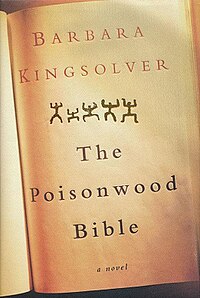The Poisonwood Bible: Difference between revisions
m Undid revision 475419677 by 173.220.183.195 (talk)Rvv |
GrahamHardy (talk | contribs) |
||
| Line 70: | Line 70: | ||
[[Category:Belgian Congo in fiction]] |
[[Category:Belgian Congo in fiction]] |
||
[[Category:Postcolonial literature]] |
[[Category:Postcolonial literature]] |
||
[[Category:Novels set in |
[[Category:Novels set in the Democratic Republic of the Congo]] |
||
Revision as of 20:55, 12 February 2012
 | |
| Author | Barbara Kingsolver |
|---|---|
| Cover artist | Julie Metz |
| Language | English |
| Genre | Domestic fiction Historical fiction |
| Publisher | Harper Flamingo |
Publication date | 1998 |
| Publication place | United States |
| Media type | Print (Hardcover and Paperback) and audio-CD |
| Pages | 546 (hardcover), 543 (paperback) |
| ISBN | 0-06-017540-0 |
| OCLC | 38916924 |
| 813/.54 21 | |
| LC Class | PS3561.I496 P65 1998 |
The Poisonwood Bible (1998) by Barbara Kingsolver is a bestselling novel about a missionary family, the Prices, who in 1959 move from Georgia to the village of Kilanga in the Belgian Congo, close to the Kwilu River. (The nearest town, an impossibly long journey away, is Bulungu.) The Prices' story, which parallels their host country's tumultuous emergence into the post-colonial era, is narrated by the five women of the family: Orleanna, long-suffering wife of Baptist missionary Nathan Price, and their four daughters—Rachel, Leah, Adah, and Ruth May.
Plot introduction
Orleanna Price narrates the introductory chapter in five of the novel's seven sections. The narrative then alternates among the four daughters, with a slight preference for the voice of the most outspoken one, Leah. The four girls increasingly mature, as each adapts differently to African village life, to the misogyny of their father, and the political turmoil that overtakes The Congo in the 1960s. Since we see the Congolese villagers through the eyes of the growing daughters, our view changes. At first, they appear as ridiculous savages. But as the girls mature, the villagers become fully fleshed-out human beings immersed in a complex, sophisticated culture. Nathan's lack of responsiveness to this culture wears out his family's welcome, but he refuses to depart. It is only after a series of misfortunes, culminating in the death of one of the daughters, that the women leave the father to his folly. The survivors take very different paths into their futures, which are described up to the 1990s. The novel ends at the time of the death of Mobutu Sese Seko.
Major characters
- The Prices
- Orleanna Price – Nathan's wife, born in Mississippi, the mother of four daughters, deferential to her husband but independent-minded
- Nathan Price – an evangelical Baptist minister and a World War II veteran from Georgia, determined to save Africa for Jesus
- Rachel Price (15 at start of the novel) – the oldest Price girl, blonde, self-centered, obsessed with her looks and with American consumer culture
- Leah Price (14 at start of the novel) – Adah's twin, intelligent, self-confident, competitive, tenacious and compassionate, prone to dogmatism and concerned with her own salvation, tomboyish
- Adah Price (14 at start of the novel) – Leah's twin, hemiplegic from birth, silent, brilliant in math and languages, witty, skeptical, sarcastic, envious of Leah, and prone to self-pity
- Ruth May Price (5 at the start of the novel) – the youngest Price, playful, independent, adventurous, perceptive and inquisitive
- Other characters
- The Underdowns – Belgian mission chiefs who welcome and send supplies to the Prices
- Eeben Axelroot – corrupt South African mercenary pilot
- Anatole Ngemba – village teacher, orphan, fluent in English interpreter for Nathan's sermons
- Brother Fowles – New Yorker, the Prices' predecessor on the mission, married a local woman
- Mama Tataba – a village woman, formerly employed by Fowles, who works for the Prices
- Tata Ndu – the village chief
- Tata Kuvudundu – the spiritual leader of the village
- Nelson – an orphaned village boy, Anatole's student, who works for the Prices, who is forced to sleep outside in the chicken coop.
- Methusaleh – a parrot left by Brother Fowles, excellent at imitating human speech
Reception and awards
The Poisonwood Bible was selected for Oprah's Book Club in 1999. The book won the 2000 Boeke Prize and was nominated for the Pulitzer Prize in 1999.
